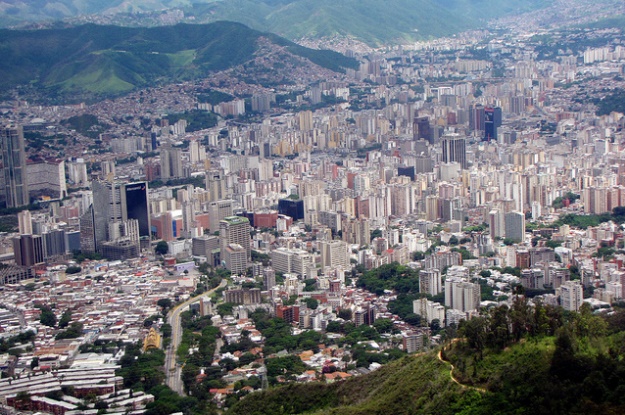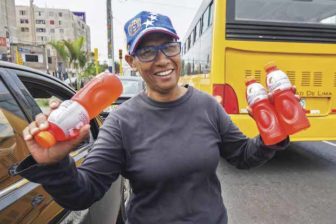Already the most dangerous city in the world, Venezuela’s capital is only getting more dangerous for people like city councilman Jesús Armas. Since the 29-year-old was first elected in December 2013, he has seen the Caracas’ murder rate rise to 120 homicides per 100,000 people – and he expects this to worsen further amid deadly confrontations such as a March shootout between drug gangs and police that killed 10 people.
“In recent weeks we have seen real massacres as authorities turned a blind eye,” says Armas, who represents the downtown parishes of Catedral, San Juan, Santa Teresa and El Paraíso.
In the following Q&A, Armas discusses with AQ how this violence affects his constituents, its economic roots in hyperinflation and food shortages, and how the problem might be tackled. The councilman got into politics in 2007 as a student leader during protests against the government’s closure of Radio Caracas Televisión (RCTV), which had been a vocal critic of former President Hugo Chávez. He later became youth coordinator for the opposition party Primero Justicia (PJ), which he now represents on the city council.
Americas Quarterly: Analysts expect Caracas’ violence and crime to worsen. What is your outlook?
Jesús Armas: This year will without a doubt be the most violent in the history of our city; without justice, without a state, people become like werewolves. And now it is not just about the criminal groups, but also about everyday citizens lynching criminals and the total dehumanization of the city. We know that this is a temporary period, with very serious consequences, but that in a few years we will look back with shame. We will know we were able to overcome this situation because the country understood that the only way forward is through solidarity, unity of the nation and entrepreneurship.
We have no doubt that Caracas can overcome violence, return to being a leading city in the region, regain its vocation as a city of progress, and that hope will return to the homes of the city.
AQ: Why did you want to get into politics?
JA: What specifically inspired me to work in politics was the feeling that political, civil and economic freedoms in the country, especially freedom of expression, were being lost. The moment that had the biggest impact on me was the closure of RCTV, the oldest and most important TV station in the country. A few years after that, I understood that for a profound transformation of society to take place, we would need to start from the local level. So I started to work in the most populous and violent sectors of our city.
AQ: How does crime and violence affect the people in Caracas on a daily basis?
JA: There have been some very tragic examples. For example, in the area around the cemetery, armed groups imposed a curfew requiring that the community not move through the area after 7 p.m. We see people who live in the area running to get home before 7 p.m., because if they don’t, they could be assaulted or killed.
We have also seen the dehumanization of our citizens, and even some people trying to take justice into their own hands. A couple of weeks ago, we saw a crowd lynch a thief and set him on fire. While the man was burning, passersby continued on as if it were an everyday event.
In some areas, residents and businesses must pay a monthly fee to armed gangs in exchange for security. This is what living in Caracas is like: fear, despair and violence.
AQ: Why is Caracas so violent?
JA: The insecurity has three roots. The first is associated with levels of poverty and inequality that we see in the city. Today Venezuela is the country with the highest inflation in the world, with shortages that force people to line up for hours to buy food. For decades neighborhoods have sprung up outside the city, and now more than 50 percent of the city’s population lives in places where houses are built with low-quality materials, and where they don’t formally have access to basic public services and are without roads or consolidated public spaces.
The second element has to do with a culture of lawlessness. In the country, a habit of disrespect for most basic laws – those related to transit, shoplifting, even the ways the authorities and the rest of the population interact with these laws, has resulted in a collective indifference toward much larger crimes because the law is simply a dead letter.
Finally, there is the reaction of the national and local government in terms of managing the violence. The truth is that we have a mayor who, through hate speech and a series of acts of violence promoted by groups related to his party and his administration, has over the years exhibited excessive permissiveness toward huge criminal groups that dominate vast and populous parts of the city, either because they handle drug trafficking or because they have a monopoly on violence and illegal activities that generate income.
Likewise, the state has implemented a policy that has nothing to do with protecting life, liberty and property of citizens, but on the contrary, has driven a socialist model that seeks to limit those freedoms, using crime as a way to maintain power and control of the population. But the truth is that today things are out of control and we are left with a failed state in which the so-called peace zones are micro-states controlled by gangsters and not by constitutional institutions.
AQ: What do the people, the police, and government need to do to fix the situation?
JA: We have started a process of civic organization to promote sports, culture and co-existence in public spaces, and not allow it to be violence that takes over the streets. But in many places it is too late to use only policies of prevention. The government needs to change its bloated policies and complicity with crime, and directly attack the economic model to make way for progress and dramatically reduce poverty and, in parallel, regain state control over areas dominated by “mega-criminal groups.” We need to work in a way very similar to Medellín, stopping the Pablo Escobars of each locality and intervening in the poorest areas to create opportunities for young people to work. Stopping the culture of violence will help replace the city model we have with one in which dignity comes first.
AQ: The city council’s president was killed two years ago, and you have personally been attacked in recent weeks. Are you ever fearful for your safety?
JA: We have already been victims of three politically-motivated attacks so far this year, but this will not break our will to change the country. We have a dream to fulfill and transform Caracas from a city of fear to a city of hope, dignity, and freedom. We know we are doing the right thing and that God is the only protection we need.








